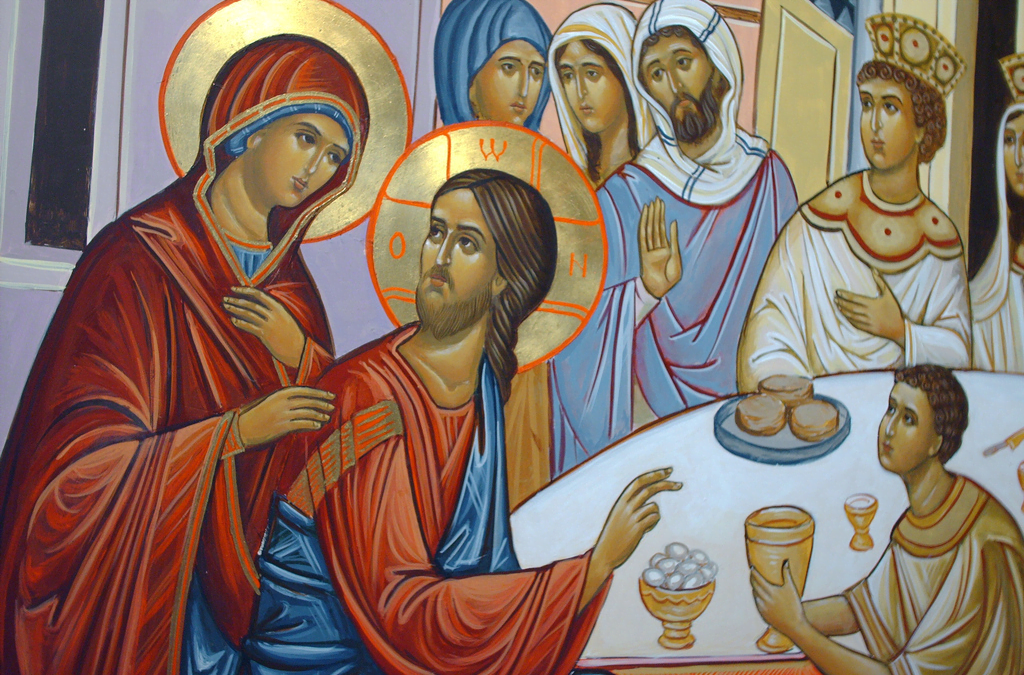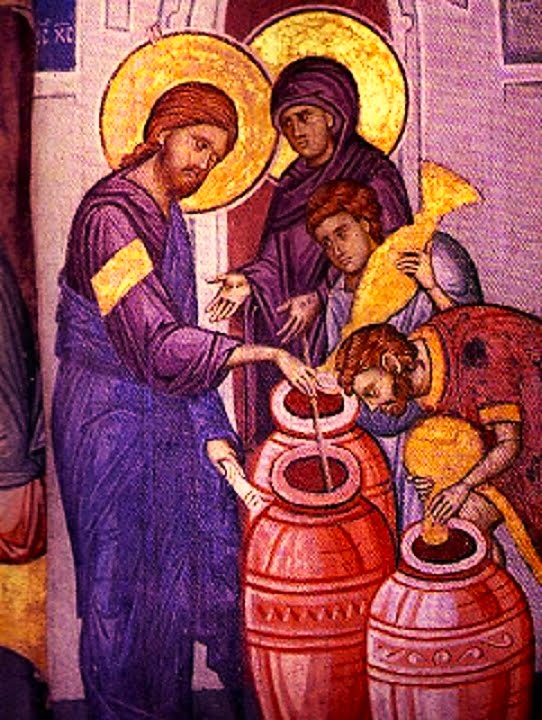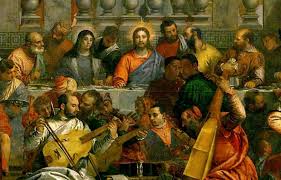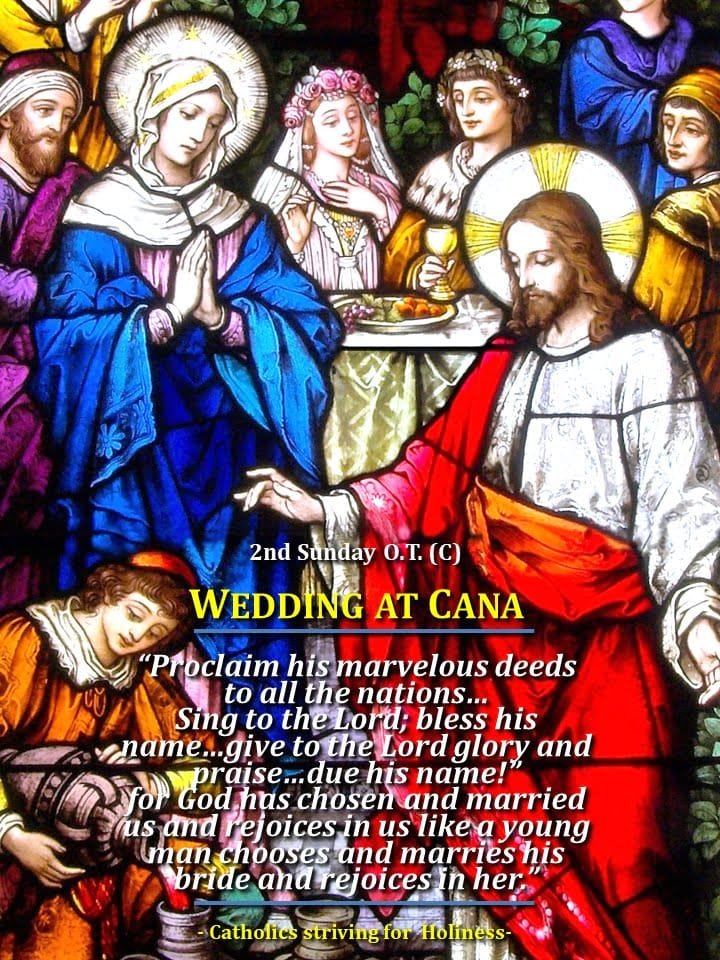POPE FRANCIS ON THE 2ND SUNDAY IN ORDINARY TIME YEAR C.

ANGELUS
Saint Peter’s Square
Sunday, 16 January 2022
_________________________
Dear brothers and sisters, buongiorno!
The Gospel of today’s liturgy recounts the episode of the wedding at Cana, where, to the couple’s delight, Jesus transformed water into wine. This is the way the account ends: “This, the first of his signs, Jesus did at Cana in Galilee, and manifested his glory; and his disciples believed in him” (Jn 2:11). We notice that the evangelist John does not speak of a miracle, that is, of a powerful and extraordinary deed that provokes wonder. He writes that a sign took place at Cana, a sign that sparked the faith of his disciples. We can, then, ask ourselves: What is a “sign” according to the Gospel?
It is a sign that gives a clue that reveals God’s love, that does not call attention to the power of the action, but to the love that caused it. It teaches us something about God’s love that is always near, tender and compassionate. Jesus’ first sign took place when a couple faced a difficulty on the most important day of their lives. Right in the middle of the feast, an essential element for a feast, the wine, is missing and their joy risked being snuffed out due to the criticism and dissatisfaction of the guests. Imagine how a wedding feast could go ahead only with water. How terrible! What a bad impression the couple would make.
It is Our Lady who became aware of the problem and discretely brought it to Jesus’ attention. And he intervened without fanfare, almost without making it obvious. Everything took place reservedly, everything took place “behind the scenes” – Jesus told the servants to fill the jars with water, then it became wine. This is how God acts, near to us and discretely. Jesus’ disciples understood this: they saw that, thanks to him, the wedding banquet became even more beautiful. And they saw the way Jesus acted as well – the way he served hiddenly (this is Jesus – he helps us, he serves us hiddenly) in that moment so much so that it was the groom who was complimented for the good wine. Nobody was aware of it, only the servants. This is how the seed of faith began to develop within them – that is, they believed that God, God’s love, was present in Jesus.
How beautiful it is to think that the first sign Jesus accomplished was not an extraordinary healing or something prodigious in the temple of Jerusalem, but an action that responded to a simple and concrete need of common people, a domestic gesture. Let us put it this way – a miracle done on tip toes, discretely, silently. Jesus is ready to help us, to lift us up. And then, if we are attentive to these “signs”, we will be conquered by his love and we will become his disciples.
But there is another distinctive characteristic about the sign at Cana. Generally, the wine provided at the end of the feast was not as good – this is still done today. At that point, people don’t distinguish as well if it is good wine or wine that’s been diluted a little. Jesus, instead, acts in such a way that the feast ends with better wine. Symbolically, this tells us that God wants what is better for us, he wants us to be happy. He does not set limits and he does not ask us for incentives. There is no place for ulterior motives or demands placed on the couple. No, the joy Jesus brought to their hearts was complete and disinterested joy, a joy that was not diluted, no!
So, I want to suggest an exercise to you that would be very good for us. Today, let us try to rummage through our memories, looking for the signs the Lord has accomplished in my life. Let each of us say: in my life, what are the signs the Lord has accomplished? What are the hints of his presence, the signs he has done to show that he loves us? Let us think about that difficult moment in which God allowed me to experience his love… And let us ask ourselves: what are the discrete and loving signs through which he has allowed me to feel his tenderness? When have I felt the Lord nearer to me? When have I felt his tenderness and his compassion more? Every one of us has these moments in our personal history. Let us go in search of these signs, let us remember them. How have I discovered his nearness and how did it fill my heart with great joy? Let us relive the moments in which we have experienced his presence and Mary’s intercession. May she, the Mother who is always attentive as at Cana, help us treasure the signs of God’s presence in our lives.
SOURCE: https://www.vatican.va/content/francesco/en/angelus/2022/documents/20220116-angelus.html EMPHASIS MINE.
ANGELUS
Saint Peter’s Square
2nd Sunday in Ordinary Time Year C, 20 January 2019
Dear Bothers and Sisters, Good morning!
Last Sunday, with the Feast of the Baptism of the Lord, we began the journey in the liturgical time called “Ordinary”; the time to follow Jesus in his public life, in the mission for which the Father sent him into the world. In today’s Gospel (cf. Jn 2:1-11) we find the narrative of Jesus’ first miracle. The first of these prodigious signs takes place in the village of Cana, in Galilee, during a marriage celebration. It is not by chance that there is a wedding at the beginning of Jesus’ public life, because in him, God espoused humanity: this is the Good News, even though those who invited him do not yet know that the Son of God is seated at their table and that he is the true bridegroom. Indeed all the mystery of the sign of Cana is based on the presence of this divine bridegroom, Jesus, who begins to reveal himself. Jesus manifests himself as the bridegroom of the People of God, announced by the prophets, and he reveals to us the depth of the relationship which unites us to him: it is a New Covenant of love.
In the context of the Covenant, the symbol of wine, which is at the heart of this miracle, is fully understood. Just as the feast is culminating, the wine runs out. Our Lady notices this and says to Jesus: “They have no wine” (v. 3). Because it would have been bad to continue the feast with water! An embarrassment for those people. Our Lady notices and, as she is a mother, she immediately turns to Jesus. The Scriptures, especially Prophets, point to wine as a typical element of the messianic banquet (Am 9:13-14; Joel 2:24; Is 25:6). Water is necessary to live but wine expresses the abundance of the banquet and the joy of the celebration. A feast without wine? I don’t know…. By transforming into wine the water from the stone jars used “for the Jewish rites of purification” (v. 6) — it was customary: to purify oneself before entering a home — Jesus effects an eloquent sign. He transforms the Law of Moses into Gospel, bearer of joy.
And then, let us turn to Mary. The words that Mary addresses to the servants crown the spousal picture of Cana: “Do whatever he tells you” (Jn 2:6). Today too, Our Lady tells all of us to “Do whatever he tells you”. These words are a precious legacy that our Mother left us. And indeed, the servants in Cana obey: “Jesus said to them, ‘Fill the jars with water.’ And they filled them up to the brim. He said to them, ‘Now draw some out and take it to the steward of the feast.’ So they took it” (vv. 7-8). Truly, a New Covenant is pledged at this wedding. And a new mission is entrusted to the servants of the Lord, namely, the entire Church: “Do whatever he tells you”. To serve the Lord means to listen and to put his Word into practice. It is the simple, essential recommendation of Jesus’ Mother. It is the programme for a Christian’s life.

I would like to highlight an experience which many of us have certainly had in life. When we are in difficult situations, when problems arise that we do not know how to resolve, when we feel a lot of anxiety and distress, when we lack joy, go to Our Lady and say: “We have no wine. The wine has run out: Look at the state I am in, look at my heart, look at my soul”. Say it to the Mother. And she will go to Jesus to say: Look at this one: he or she has no wine. And then, she will come back to us and say: “Do whatever he tells you”.
For each of us, drawing from the jar is tantamount to entrusting ourselves to the Word and to the Sacraments in order to experience God’s grace in our lives. Then we too, as the steward who tasted the water that had become wine, can say: “you have kept the good wine until now” (v. 10). Jesus always surprises us. Let us speak to the Mother so that she may speak to her Son and he will surprise us.
May she, the Holy Virgin, help us to follow his invitation: “Do whatever he tells you”, so that we can fully open up to Jesus, recognizing in everyday life the signs of his vitalizing presence.
Source: https://www.vatican.va/content/francesco/en/angelus/2019/documents/papa-francesco_angelus_20190120.html
Emphasis mine.

ANGELUS
Saint Peter’s Square
2nd Sunday in Ordinary time Year C, 17 January 2016
Dear Brothers and Sisters, Good morning!
This Sunday’s Gospel presents the prodigious event that occurred at Cana, a village in Galilee, during a wedding feast also attended by Mary and Jesus, with his first disciples (cf. Jn 2:1-11). The Mother points out to her Son that the wine has run out, and, after responding that his hour had not yet come, Jesus nevertheless accepts her request and gives to the bride and groom the best wine of the entire feast. The Evangelist underlines that this was the first of the signs Jesus performed; it “manifested his glory; and his disciples believed in him” (v. 11).
Miracles, thus, are extraordinary signs that accompany the Good News and have the purpose of causing or strengthening faith in Jesus. In the miracle performed at Cana, we are able to glimpse an act of benevolence on the part of Jesus toward the bride and groom, a sign of God’s blessing on the marriage. The love between a man and a woman is therefore a good path through which to live the Gospel, that is, to set out with joy on the path of holiness.
Yet the miracle at Cana does not pertain only to spouses. Every human person is called to encounter the Lord in his or her life. Christian faith is a gift which we receive in Baptism and which allows us to encounter God. Faith intersects times of joy and pain, of light and darkness, as in every authentic experience of love. The narrative of the wedding at Cana invites us to rediscover that Jesus does not present himself to us as a judge ready to condemn our faults, nor as a commander who imposes upon us to blindly follow his orders; he is manifest as Saviour of mankind, as brother, as our elder brother, Son of the Father: he presents himself as he who responds to the expectations and promises of joy that dwell in the heart of each one of us.
Thus we can ask ourselves: do I really know the Lord like this? Do I feel him close to me, to my life? Am I responding to him on the wavelength of that spousal love which he manifests each day to everyone, to every human being? It is about realizing that Jesus looks for us and invites us to make room in the inner reaches of our heart. In this walk of faith with him we are not left alone: we have received the gift of the Blood of Christ. The large stone jars that Jesus had filled with water in order to transform it into wine (v. 7) are a sign of the passage from the old to the new covenant: in place of the water used for the rites of purification, we have received the Blood of Jesus, poured out in a sacramental way in the Eucharist and in the bloodstained way of the Passion and of the Cross. The Sacraments, which originate from the Pascal Mystery, instill in us supernatural strength and enable us to experience the infinite mercy of God.
May the Virgin Mary, model of meditation of the words and acts of the Lord, help us to rediscover with faith the beauty and richness of the Eucharist and of the other Sacraments, which render present God’s faithful love for us. In this way we fall ever more in love with the Lord Jesus, our Bridegroom, and we go to meet him with our lamps alight with our joyous faith, thus becoming his witnesses in the world.
Source: https://www.vatican.va/content/francesco/en/angelus/2016/documents/papa-francesco_angelus_20160117.html
Emphasis mine.
Stay updated: subscribe by email for free TO OUR NEW WEBSITE www.catholicsstrivingforholiness.org (PUT YOUR EMAIL IN THE SUBSCRIBE WIDGET).
We are also in www.fb.com/Catholicsstrivingforholiness. Kindly help more people in their Christian life by liking our page and inviting your family, friends and relatives to do so as well. Thanks in advance and God bless you and your loved ones! Fr. Rolly Arjonillo


